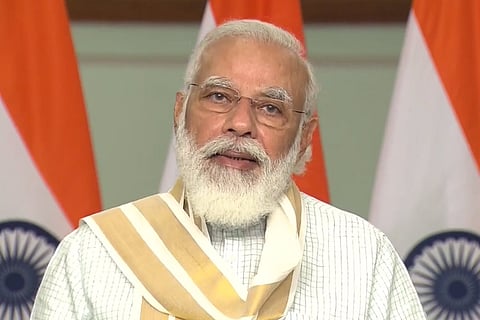

Prime Minister Narendra Modi on Thursday unveiled faceless tax scrutiny and appeal on Thursday. The Income Tax department will also adopt a 'taxpayer charter' which outlines rights and responsibilities of both tax officers and taxpayers. The Prime Minister said that faceless assessement and taxpayers charter are available from Thursday, and faceless appeal will be available from September 25.
“The honest taxpayers of the country play a very big role in nation building. When the life of the country's honest taxpayers becomes easier, the country also develops, the country also moves forward,” the Prime Minister said.
Stating that the rules and regulations are process-centric and power-centric approach, the Prime Minister added that the government is now making it people-centric and public friendly
“The effort is to make our tax system seamless, painless and faceless. Seamless means the tax administration should work to solve the problem instead of engaging every taxpayer. Painless means right from technology to the rules, the process should be simple,” he said.
> Faceless assessment: PM Modi said it shouldn’t matter who the taxpayer is and who the tax officer is. He said that previously, the Tax Department in the state where the taxpayer resides had jurisdiction, but now the faceless team will be assigned at random by a computer.
The Ministry of Finance said that along with the abolition of territorial jurisdiction and cases being allocated automatedly at random, the selection will only be through data analytics and AI. Notices will be centrally issued with a Document Identification Number (DIN). With no physical interface, there is no need to visit the income tax office. The draft assessment order will be in one city, review in a second and finalisation in a third city.
> For faceless appeal, the ministry said that they will be randomly allotted to any officer in the country whose identity will remain unknown, and the appellate decision will be team-based and reviewed.
> The Ministry said exceptions for faceless assessment and appeal are cases relating to serious frauds, major tax evasion, sensitive matters, international tax, and the Black Money Act and benami property.
> Barring exceptions, assessments and appeals will only be faceless as part of the new system. The new system says that there can be no intrusive and survey actions by field officers but can be done only by the investigation wing and TDS wing after approval by officers of the level of Chief Commissioner or above.
> The Budget for 2020-21 fiscal unveiled on February 1, had announced a 'taxpayer charter', which is expected to have statutory status and will empower citizens by ensuring time-bound services by the Income Tax Department. The charter will ensure trust between a taxpayer and the administration and reduce harassment, as well as increase efficiency of the department, Finance Minister Nirmala Sitharman had said in her Budget speech. This now comes into effect from Thursday.
Taxpayers’ Charter unveiled! Demonstrating the commitment of IT Department towards improving taxpayer services and holding itself accountable, it clearly articulates taxpayers’ rights and responsibilities even as it sets out its expectations from them. (6/7)#HonoringTheHonest pic.twitter.com/QH2wBfegjW
— Ministry of Finance (@FinMinIndia) August 13, 2020
The Central Board of Direct Taxes (CBDT), which is the apex decision making body in direct tax matters, administers personal income tax and corporate tax.
Currently, most of the functions of the Income Tax Department starting from the filing of the return, processing of returns, issuance of refunds, and assessment are performed in the electronic mode without any human interface.
The Prime Minister said that faceless appeasement and taxpayers charter are available from Thursday, and faceless appeal will be available from September 25.
With inputs from PTI